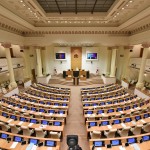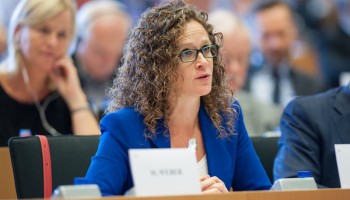Each month MEPs are given a tax-free lump sum of €4,342, called the General Expenditure Allowance (GEA). The fund costs the EU around €40 million annually and is meant to provide MEPs with national offices that, among other things, should keep them in touch with citizens.
The series of investigations across all 28 members states, however, found that in 249 cases MEPs either said they have no offices, refused to reveal their addresses, or the locations could not otherwise be tracked.
In at least 42 cases, MEPs are using the funds for their own national political parties or even paying them into their own personal bank accounts.
Only 133 out of the 748 current parliamentarians told journalists what they pay in rent office, and only 53 said they were willing to share documents on their public spending.
The EU Parliament does not audit the use of these expenses payments, so there is no documentation available for how the GEA is being used.
Many parliamentarians claimed to use all their GEA for work-related purposes, including travel expenses for visitors and charity donations. Some paid the total lump sum to their national party.
In Germany alone, eight MEPs are themselves the owners of the building where their national offices are located. The office of Manfred Weber, from the European People’s Party, sits in an annex to his private home in the Bavarian countryside – far away from the more populated areas of the region.
19 MEPs confirmed they work from home. 38 MEPs also confirmed that they sub-let these EU-funded offices to a local or national political party branch, while others refused to answer the question.
In a considerable number of cases, it was unclear what use MEPs make of their expense payments. Members from Belgium, the Netherlands, Germany, Spain, Italy and Bulgaria do not appear to maintain any national office at all.
In Poland, all 51 MEPs failed to reply to repeated questions about their public spending.
Yet, only five to 20 MEPs have since 2010 returned the unused funds, according to the European Parliament.
The findings contradict the EU parliament’s claim that MEPs should attempt to bridge the gap between Brussels and EU citizens.
Nine weeks are set aside in the parliament’s 2017 calendar for political work outside Brussels and Strasbourg, and four each year in which "MEPs concentrate exclusively on constituency work."
MPS are not allowed to use the GEA for national party or personal purposes and must use these offices "solely for the exercise of the European mandate", EU parliament spokesperson Marjory Van Den Broeke told the investigation.
She admitted, however, that the parliament has no way of knowing if and how these conditions are being respected: "the fact that it’s a lump sum means that MEPs do not need to hand in any invoices or other bills."
In April, MEPs voted down amendments asking for more transparency and at least random checks of the use of the GEA.
"I could never imagine MEPs giving out 40 million a year to member states for cohesion policy, without one receipt," Transparency International’s EU policy officer Nick Aiossa told The MEPs Project.
"There is a level of hypocrisy on the financial management score that we find is quite astounding. We talk about the rise of the eurosceptic nationalist forces, […] and yet here we see such small but symbolic problem with the parliament that can be fixed, literally, almost immediately," Aiossa said.






